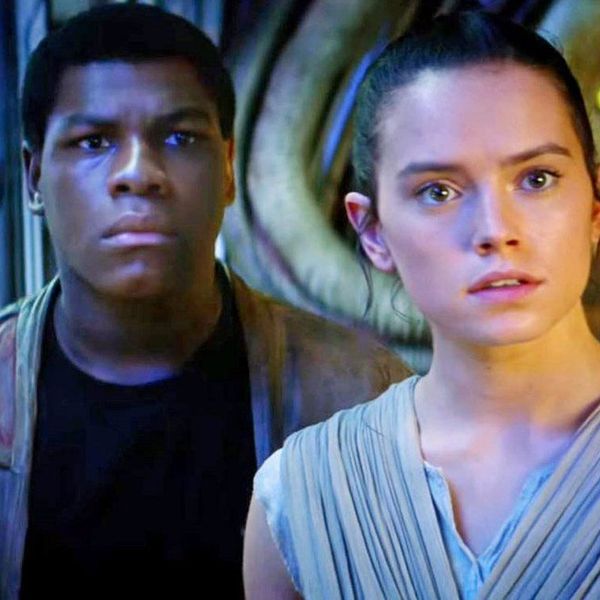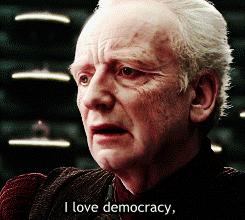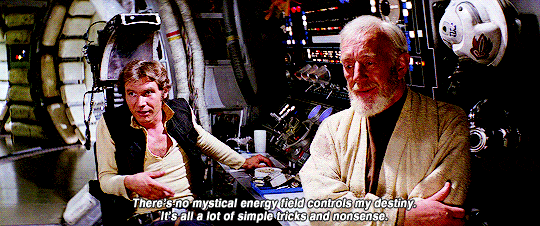Star Wars is more than action and romance.
Actually, Star Wars is a lot more than those two things.
One might correlate the two when they think of the franchise (which has made over 1 billion dollars). But the immediate presence of politics is essential to the plot - something many people often take for granted.
The films are a prime example of how easily an empire can rise or fall and how it could potentially ruin an entire world. If the Milky Way were a civilized galaxy we might definitely have the same tragedies: planets would be destroyed by warfare, people would starve, slavery might still be around, and different species could be battling racism every day.
What can we exactly relate to from this franchise? And what can we learn?
I. The church and the state
The first thing to consider is the evident theology of the Force and how it corresponds with the entirety of the Star Wars government. Political leaders are convicted by their beliefs throughout the whole series...much like our politicians across the globe.
Palpatine is one of them.
If you've ever watched the films you know that Senator/Chancellor/Emperor Palpatine is actually Lord Sidious; the first Sith lord to come to light in over a thousand years (which is a bit of a plot hole but we won't go into that). Palpatine took advantage of the system, devising strategies that made people believe he wanted democracy and peace across the galaxy. Unfortunately, that wasn't the case. And his motivation for it? He wanted the Dark Side to engulf the universe. The decisions he made and the movements he proposed were all in favor of his belief in the Force.
How does this relate to our home?
Many people in Congress vote for laws because of their religious convictions and morals. Whatever you may believe in, it's a conflict of interest and unfair to the rest of the nation - something that George Lucas has made very clear in the films.
Another interesting parallel between Palpatine and previous rulers of our Earth is his distinct similarities to men like Hitler and Napoleon (there are tons of articles about this). Palpatine dissolved the Republic and made himself emperor - something Napoleon did. These similarities are quite obvious if you've watched the films and it doesn't take a historian to know he was based on a (real) devious ruler or two. Though, granted, Palpatine never created a "Palpa-tinic Code".
In A New Hope Darth Vader is accused of letting his personal interest in the Force affect his political power - something we also see in The Force Awakens with his grandson Kylo Ren. And, really, it was the truth. Vader made tricky decisions based on his love for the Dark side - even killing "younglings" (children) to achieve his goal of the Jedi purge.
Separation of the church and the state is an urgent matter to many people across the world. Unfortunately, George Lucas didn't exactly separate the two considering the Jedi's favoring of the Republic.
II. The Trade Federation and...NAFTA
If you know anything about politics, you'll understand that fair trade (or trade in general) is a very important agreement between countries. In Star Wars's case it's between the Trade Federation and Naboo - a small planet affiliated with the Republic.
In The Phantom Menace we see how the war in the films began. The Trade Federation cut ties with Naboo and stopped their shipping. In our world, that's basically an act of war. Placing sanctions on other countries is considered a passive move and, apparently, in the Star Wars universe it is as well.
How does this relate to our home?
We might look towards NAFTA which was a negotiation put into action by George Bush (senior). There were many problems with NAFTA (for one thing, it put many Mexican farmers out of business) and hundreds, if not thousands, of Americans hated the agreement
Trade is, and always will be, an extremely important factor of a pleasant society. Trade effects the economy in all countries and loses the support of the people if executed wrong.
III. Political affiliations
Despite the fact that most of the main characters in Star Wars correspond their political coalition with their belief in the Force, there are what we would consider "atheists" in this fictional universe as well.
Han Solo makes this clear in A New Hope.
The rebels in the original films were clearly very passionate about the Republic despite their ignorance of the Force. This is also true of those who support the Empire (ex: "I find your lack of faith disturbing.").
Separate parties will always exist no matter what anyone says. Opinions will always be around - there's really nothing you can do to stop it.
How does this relate to our home?
George Washington was a devoted believer in dissolving political parties.
"-interest and duty of a wise people to discourage and restrain it [political parties]." -George Washington
In the 18th century, there was a list of men of who you voted for. Parties didn't really exist in the colonies until 1796. But, eventually, they were established.
Most men and women who run for the presidency are either democrat or republican - anything in-between doesn't stand a chance. And the idea that one must affiliate themselves as one or another might lead people to believe they hold steady on certain issues even if they don't.
Recently (especially during this election) libertarians are becoming more popular - and so is the green party. This might maintain a bit of stability among the people, as libertarians tend to lean both ways. (Sort of like the grey side - a belief in Star Wars many people don't know about.)
IV. Peace through strength
The Empire made it very clear that they followed the mantra, "peace through strength". They believed that the fear of those across the galaxy would lessen resistance. And though this is a great strategy in war, it's extremely unethical.
We see this various times in the films even though it's usually not exhibited the way we'd like. In A New Hope they destroy Alderaan (Princess Leia's home planet) to prove a point; don't mess with the Empire. Fear loosens the courage of people and, alas, it does work.
How does this relate to our home?
"Peace through strength" was originally a plan of action practiced by the Roman emperor Hadrian, but Ronald Reagan made it famous. During the Cold War he made it specifically clear that the United States would remain safe if they practiced their strength as a show.
America essentially had the same message the Empire did in Star Wars; if you attempt to harm us, you will be annihilated. But Reagan's game plan did work. The Russians eventually respected our strength and we began to maintain peace.
The same could be said for JFK during the Cuban Missile Crisis back in 1962 when he told the Soviet Union that he would not hesitate to strike if they launched a nuclear missile.
The similarities between real politics and Star Wars's politics is undeniable.
It's a great way to see the outcome of various situations in a fictional world without suffering the consequences. "What ifs" are great questions to ponder in theory but the results could be devastating.
George Lucas has created a spectacular vision of political corruption and war along with his legendary story line. And with the production of the original movies in the 1970's and 1980's, it's easy to see the remarkable impression the Cold War might have left on Lucas's masterpiece.
Hopefully, more politicians will watch Star Wars.























